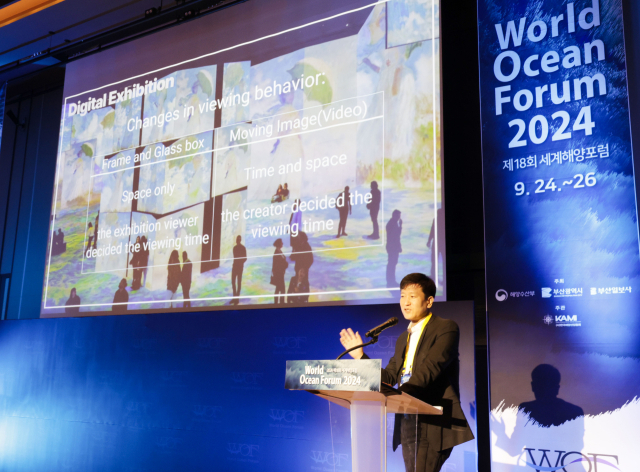
The Marine Humanities Session, considered a public session of the World Ocean Forum (WOF), focused on the changes in the ‘ocean exhibition’ due to the development of AI (artificial intelligence) this year. The KIOST Special Session looked back on the role AI played in detecting and studying the ocean, which was difficult to access.
■ Busan-style ‘underwater art museum’ proposed
The Marine Humanities session held on the 26th, the last day of the 18th WOF, was moderated by Kim Chang-kyung, Director of the Humanities Korea Plus Project at Pukyong National University, and dealt with exhibition culture in the AI era. In particular, on this day, President Cho Jeong-hyung of the Korean Society of Ocean Design highlighted an interesting topic called the 'Underwater Art Museum.' It is an idea to improve the marine environment off the coast of Busan and create a global tourism resource. President Cho said, "We need to think about whether there is a world-class cultural space that promotes Busan," and "Cancun, Mexico has achieved effects such as improving awareness and activating tourism by creating an underwater art museum that addresses the serious problem of marine waste." He added, "We need to think about what it would be like to create a new Korean-style art museum that combines AI and media art."
Baek Seung-ju, the head of the exhibition team at the National Busan Maritime Museum, introduced the changes in the maritime museum’s exhibitions using AI. Team leader Baek said, “We are expanding international exchange exhibitions, domestic exhibitions reflecting academic achievements, and exhibitions utilizing new technologies,” and “In particular, we are planning to install a large media wall in line with the AI era, build a digital ocean hall, and build a maritime culture platform utilizing the metaverse.”
In addition, on this day, Chonnam National University's Assistant Professor Kim Han-gyeol from the Department of History gave a presentation on overseas marine exhibition cases, and Seoul Institute of the Arts' Professor Ko Joo-won from the Department of Film gave a presentation on AI-related exhibitions.
Pukyung National University President Jang Young-soo said in his congratulatory speech that day, “This is an opportunity to envision a new way of exhibiting the ocean in a changing era, and I hope that future-oriented alternatives will emerge.”
■Establishment of an automatic fisheries quality inspection system
This year, the special session of the Korea Institute of Ocean Science and Technology (KIOST), a global ocean research institute, discussed how technologies such as aquatic food inspection and tidal flat detection were advanced through AI. Professor Jaesik Choi of the AI Graduate School at KAIST, who gave the session’s keynote speech, emphasized that the scope of ocean exploration has rapidly expanded with satellite and AI technologies. Professor Choi said, “AI technology enables precise prediction of changes in the types of aquatic resources and catches, as well as red tide phenomena and ocean weather.”







